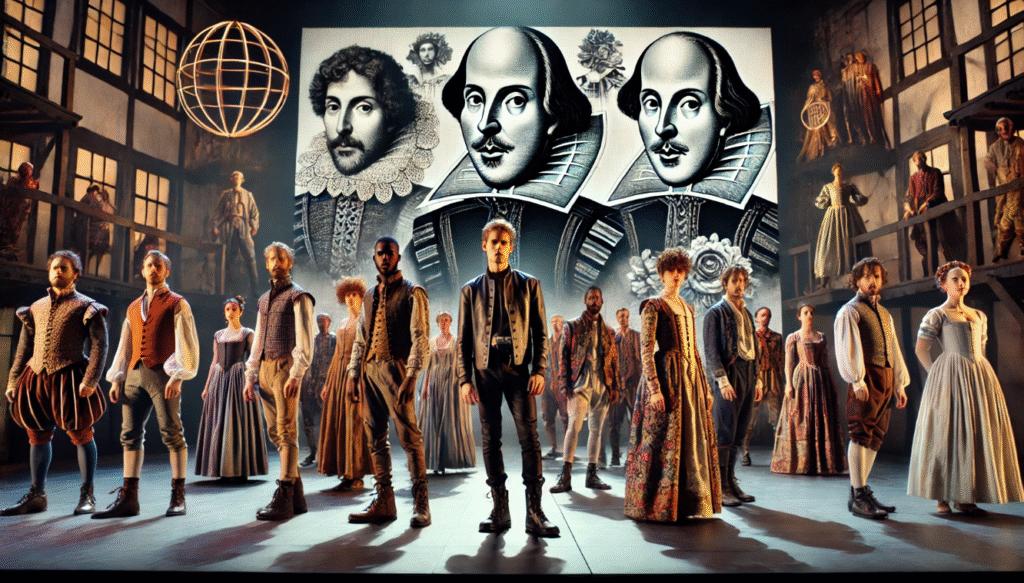
How The Impact of Shakespeare’s Theatre Shaped Cultural Identity Across Generations
Imagine stepping into a world where the struggles of love, power, and identity are as relevant today as they were centuries ago. Shakespeare’s theatre has left an indelible mark on our cultural identity, shaping everything from the language we speak to the stories we tell. But how exactly did The impact of Shakespeare’s theatre on cultural identity come to be so profound, and why does it still matter?
Over 400 years later, Shakespeare’s works continue to influence modern-day culture in ways many of us may not even realize. From the characters in our favorite movies to the language we use in daily conversations, his plays have woven themselves into the fabric of global identity. In this article, we’ll explore how Shakespeare’s revolutionary theatre has shaped our collective sense of self and continue to influence generations of thinkers, creators, and dreamers. Ready to uncover the enduring power of his words? Let’s dive in! 🎭
Table of Contents
Toggle1. Who Was Shakespeare?
William Shakespeare, often regarded as the greatest playwright in history, was born in 1564 in Stratford-upon-Avon, England. His works have influenced literature, theatre, and language for over four centuries. But who exactly was Shakespeare, and why does his legacy continue to resonate today?
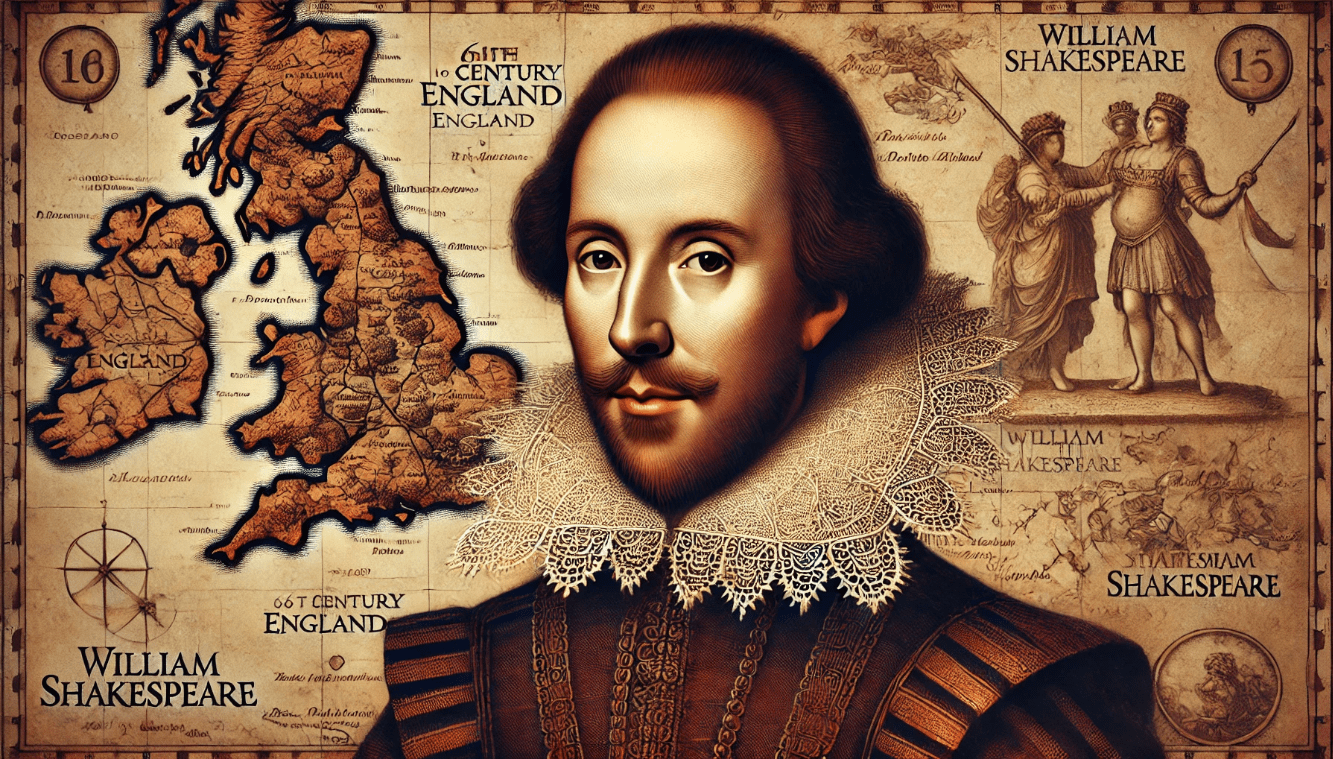
A Glimpse into Shakespeare’s Life
Shakespeare lived during the Elizabethan era, a time of great social and cultural change in England. He was not only a playwright but also an actor and a part-owner of the famous Globe Theatre in London. Throughout his career, Shakespeare wrote 39 plays, 154 sonnets, and numerous poems, creating works that explored timeless themes like love, jealousy, betrayal, and ambition.
- The Early Years: Born to John Shakespeare, a successful merchant, and Mary Arden, a daughter of the gentry, young William had a privileged upbringing. He likely attended the local grammar school, where he learned Latin, literature, and rhetoric—skills that would shape his writing.
- Career Beginnings: By the late 1580s, Shakespeare had moved to London and began writing and acting for the stage. His early plays included Henry VI and Titus Andronicus, which gained popularity and helped establish his reputation as a talented writer.
Shakespeare’s Major Works
Shakespeare’s plays fall into three main categories: tragedies, comedies, and histories. Some of his most famous works include:
- Tragedies: Hamlet, Macbeth, Othello, King Lear—plays that dive deep into human flaws and the consequences of power and pride.
- Comedies: A Midsummer Night’s Dream, Much Ado About Nothing, Twelfth Night—plays that explore love, mistaken identities, and humorous twists of fate.
- Histories: Richard III, Henry V—plays that tell the stories of English kings and explore themes of leadership and nationhood.
These works not only entertained audiences but also invited them to reflect on their own lives, struggles, and societal values.
The Shakespearean Legacy
Why does Shakespeare matter more than 400 years after his death? His ability to capture the complexities of human nature and address universal themes has made his works timeless. He was a master of language, inventing over 1,700 words and expressions still used today. Many phrases like “break the ice,” “heart of gold,” and “wild-goose chase” come from his plays. 🌍
2. The Role of Shakespeare’s Theatre in Shaping Cultural Identity
Shakespeare’s theatre didn’t just entertain—it helped shape the cultural identity of his time and continues to influence our modern understanding of society, politics, and human nature. By using his platform to explore universal themes and complex characters, Shakespeare’s plays became mirrors of the world around him, offering audiences both entertainment and profound insights into their own lives.
Shakespeare as a Reflection of Society
One of the key reasons Shakespeare’s theatre remains relevant today is its ability to mirror the societal issues of the time. His plays are not just stories—they explore political power, love, betrayal, social class, and the struggle for justice. These themes speak to the collective experience, making them timeless.
- Power and Leadership: In plays like Macbeth and Julius Caesar, Shakespeare explored the corrupting influence of power and the moral dilemmas faced by leaders. These stories continue to resonate in today’s political climate, where questions of leadership, integrity, and responsibility are always relevant.
- Love and Identity: From the tragic love story in Romeo and Juliet to the comedic misunderstandings in A Midsummer Night’s Dream, Shakespeare’s exploration of love remains one of the most powerful themes in literature. His portrayal of complex relationships helped shape how we think about love and identity today.
Shakespeare’s Theatre and the Construction of Cultural Norms
Through his plays, Shakespeare helped shape cultural norms by addressing issues that were central to both the Elizabethan era and beyond. His works contributed to how people thought about societal roles and behaviors—often challenging the status quo.
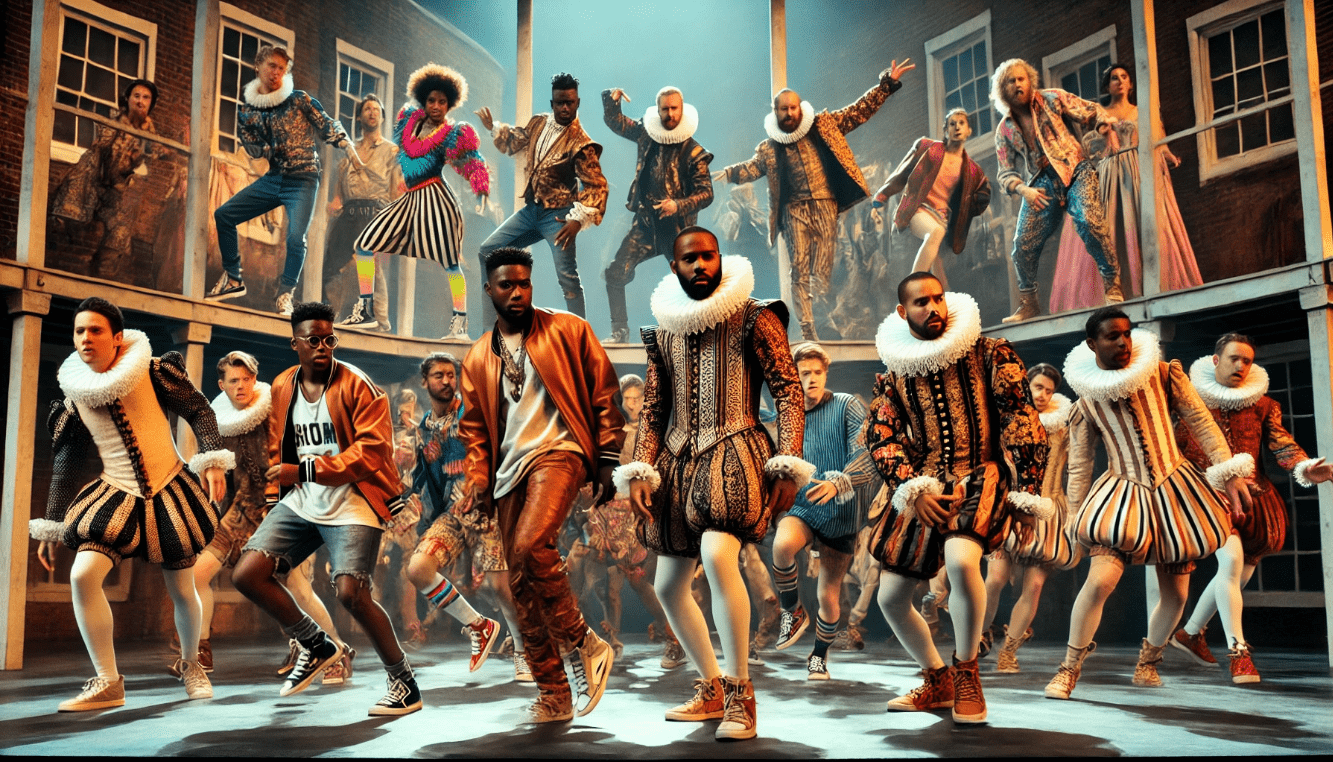
- Gender and Social Class: Shakespeare’s portrayal of women—whether strong, witty characters like Beatrice in Much Ado About Nothing or tragic figures like Ophelia in Hamlet—forced audiences to reconsider their views on gender and social roles. Similarly, his exploration of class struggles, as seen in plays like King Lear, contributed to the evolving dialogue around class divisions and societal expectations.
- Morality and Justice: Many of Shakespeare’s plays, such as The Merchant of Venice and Measure for Measure, confront the complexities of justice, mercy, and human morality. His treatment of these subjects has influenced how we perceive legal systems, ethical questions, and justice in our own cultural context.
Shakespeare’s Language: A Cultural Legacy
Shakespeare didn’t just influence society through his themes—his language also helped shape cultural identity. The richness of his language, from the beauty of his poetry to the inventiveness of his expressions, enriched English literature and communication.
- Coining New Words and Phrases: Many of Shakespeare’s words and phrases are now part of everyday English. Expressions like “break the ice,” “wild-goose chase,” and “heart of gold” were all introduced by Shakespeare. By adding new words and metaphors to the language, he played a crucial role in defining how English speakers express themselves.
- Influence on Literature and Arts: Shakespeare’s use of language in his plays laid the foundation for countless writers, poets, and playwrights who followed. His works became a model for aspiring authors and helped to develop the cultural identity of the English-speaking world.
Shakespeare as a Cultural Icon
Today, Shakespeare’s plays are performed globally, often adapted to reflect contemporary issues. The universal themes he explored—love, power, betrayal, and morality—have made his work adaptable to various cultures and eras.
- Cultural Adaptations: Shakespeare’s plays have been reinterpreted in countless ways, from modern-day film adaptations like 10 Things I Hate About You (based on The Taming of the Shrew) to international productions that reflect local cultural nuances. These adaptations keep Shakespeare relevant by showing how his work speaks to different cultural contexts.
- Shakespeare Festivals and Global Performances: His influence stretches far beyond England. Shakespeare festivals held around the world, from the US to India to Japan, provide a platform for communities to connect with his work, often reimagining the themes in ways that align with their own cultural identity.
The Lasting Impact on Cultural Identity
Ultimately, the role of Shakespeare’s theatre in shaping cultural identity is profound and ongoing. His works don’t just reflect the world—they challenge us to rethink the way we live and interact with each other. By addressing universal themes and societal issues, Shakespeare’s theatre continues to shape how we understand our own identities and our relationships with the world around us.
Shakespeare’s cultural legacy is a testament to the enduring power of storytelling. His ability to capture the human experience—across time, place, and culture—ensures that his impact on cultural identity will be felt for generations to come. 🌍🎭
3. Shakespeare’s Language: Shaping Modern English and Identity
Shakespeare wasn’t just a master storyteller—he was also a linguistic innovator. His contribution to the English language is monumental, and the impact of Shakespeare’s language continues to shape how we communicate, express emotions, and even form our identities today.
Shakespeare’s Influence on English Vocabulary
One of Shakespeare’s greatest achievements was his ability to expand the English language. He coined hundreds of words and phrases that we still use regularly. These words weren’t just random creations—they helped shape how people think and communicate, giving English speakers new ways to express themselves.
- New Words: Shakespeare introduced over 1,700 words, many of which are still in everyday use. Words like “eyeball,” “bedroom,” “fashionable,” and “swagger” were all invented by him. These words didn’t just add to the vocabulary; they also gave people new ways to talk about their experiences and the world around them.
- Creative Expressions: Shakespeare was a master at inventing phrases that have become part of common speech. Expressions like “break the ice,” “wild-goose chase,” and “heart of gold” are used by millions of English speakers every day, showing how his language continues to live on in our conversations.
Shakespeare’s Impact on English Identity
Beyond just adding words to the dictionary, Shakespeare’s use of language helped shape the cultural identity of English speakers. The way he played with language created a deeper connection to the English language itself, making it a tool for expression, storytelling, and identity-building.
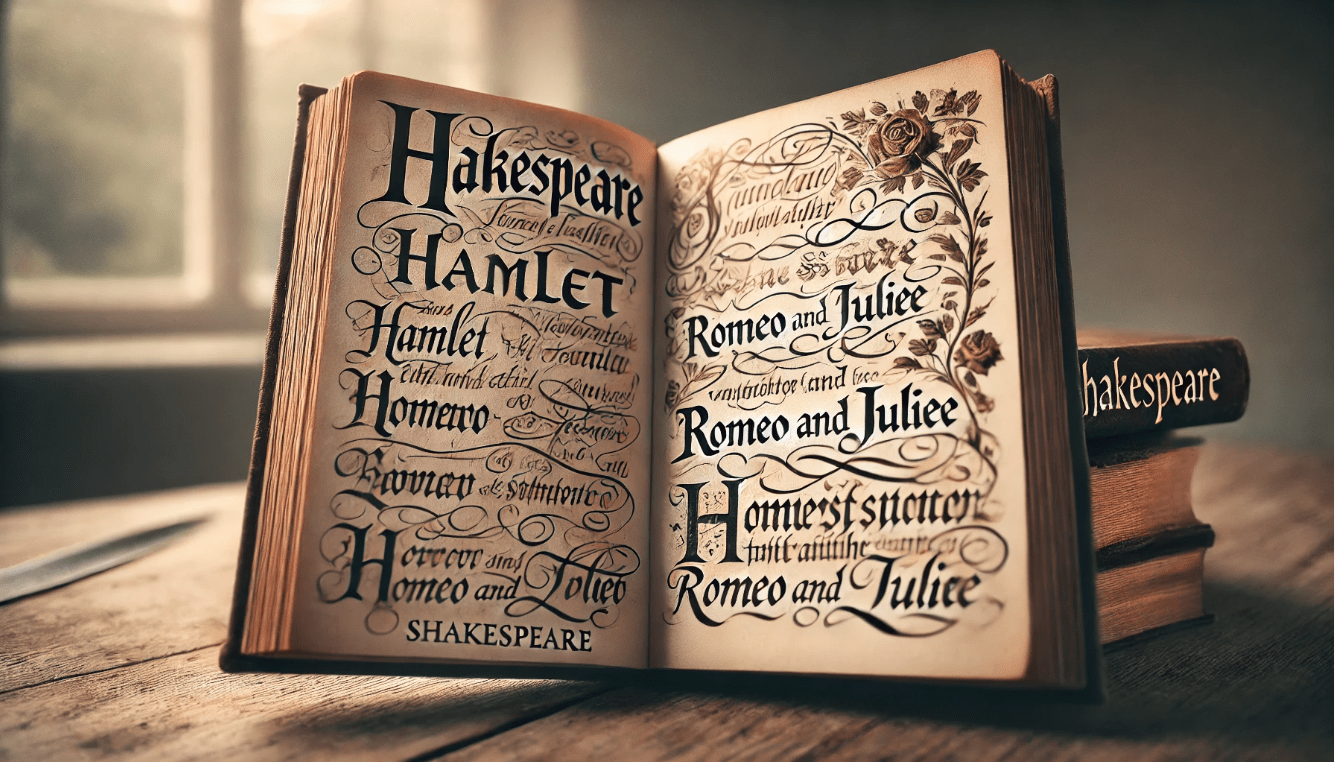
- Elevating English Literature: Before Shakespeare, English was often seen as a simple, regional language. But Shakespeare’s use of poetic devices, rich vocabulary, and intricate sentence structures raised English to a level of literary greatness. His work showed the world that English could be as expressive and profound as any other language, helping to define a cultural identity centered on the English-speaking world’s literary achievements.
- Expressing Complex Ideas: Shakespeare didn’t just create new words; he also used language to explore complex emotions and ideas. His plays delved into the depths of human nature, giving voice to everything from love and jealousy to power and ambition. By doing so, he not only shaped the language but also influenced how people express and understand their emotions, relationships, and personal identities.
Shakespeare’s Language in Modern Culture
Shakespeare’s language doesn’t just live in the pages of his plays—it’s woven into modern culture. His influence can be found in literature, media, and even the way we communicate on a day-to-day basis.
- Adaptations in Popular Media: Countless movies, TV shows, and even video games draw on Shakespeare’s language and themes. Modern adaptations of his plays, like The Lion King (based on Hamlet) or 10 Things I Hate About You (based on The Taming of the Shrew), show how his language continues to resonate with audiences, making his work accessible to new generations.
- Cultural References and Speech: Shakespeare’s phrases and words pop up in everything from casual conversations to formal speeches. Whether you’re watching a political debate or chatting with friends, you’ll often hear Shakespeare’s influence in how we express ourselves. His language has become so ingrained in English-speaking cultures that it’s hard to imagine a world without it!
Why Shakespeare’s Language Matters for Cultural Identity
Shakespeare’s language didn’t just influence the way we speak—it helped form a cultural identity. The richness and flexibility of his language gave English speakers the ability to express their values, beliefs, and individual identities in more dynamic ways. Through his words, Shakespeare elevated English into a powerful tool for personal and collective expression, one that continues to shape how we see ourselves and our world.
In short, Shakespeare’s impact on the English language goes far beyond academic textbooks. It’s a living, breathing part of how we communicate, connect, and define our identities. 🌍📖
4. The Evolution of Shakespeare’s Theatre: Influence on Cultural Identity Over Time
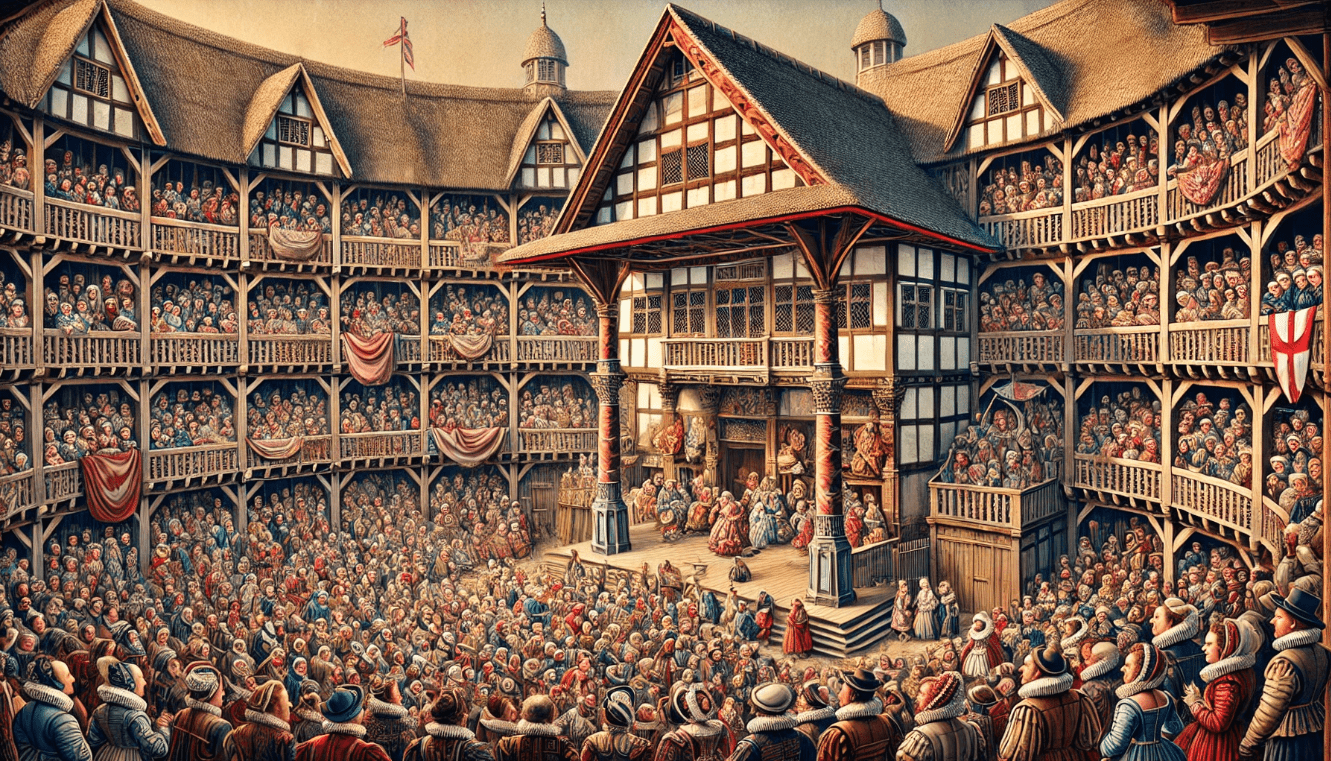
Shakespeare’s theatre didn’t just shape cultural identity in his time—it continues to evolve and influence how we understand ourselves and our societies today. Over the centuries, his works have been adapted, reinterpreted, and revived to reflect changing values, political climates, and cultural movements. Let’s explore how Shakespeare’s theatre has remained relevant and how its impact on cultural identity has evolved over time.
Shakespeare’s Theatre in the Elizabethan Era
During the late 16th and early 17th centuries, Shakespeare’s theatre was a revolutionary force in England. It provided a space for people of different social classes to gather and experience stories that mirrored their lives and challenged their perspectives.
- Entertainment for All: Shakespeare’s plays were performed at the Globe Theatre, where the audience ranged from commoners to nobility. This accessibility helped Shakespeare shape a shared cultural identity for England, breaking down social barriers and bringing people together through storytelling.
- Social Commentary: Many of Shakespeare’s plays, such as Hamlet and Macbeth, questioned authority, politics, and societal norms. This made his works a powerful tool for reflecting on social and political dynamics, influencing how people viewed their roles in society and the world around them.
The Global Impact: Shakespeare Beyond England
After Shakespeare’s death, his works spread across the globe, evolving as they encountered new cultures and audiences. His plays became a lens through which different societies examined their own values, struggles, and aspirations.
- Shakespeare in the Colonized World: During the age of colonization, Shakespeare’s plays were introduced to countries across Europe, the Americas, Africa, and Asia. In many instances, his works became a means of cultural resistance, with local artists adapting his plays to reflect their own political and social struggles.
- Modern Global Adaptations: Today, Shakespeare’s plays are performed worldwide, often adapted to local contexts. For example, in India, Macbeth is reinterpreted in Bollywood films, while A Midsummer Night’s Dream is staged in diverse cultural settings. These adaptations make Shakespeare’s work relatable to people of different backgrounds, contributing to a shared cultural identity that transcends geographical boundaries.
Shakespeare in the Romantic and Victorian Eras
In the 18th and 19th centuries, Shakespeare’s works underwent a transformation as new cultural movements—such as Romanticism and Victorianism—found relevance in his plays.
- The Romantic Era: During the Romantic period, artists and writers sought to reconnect with nature, emotion, and individualism. Shakespeare’s tragic and passionate characters, like King Lear and Othello, were embraced as representations of human emotion and suffering, adding layers of depth to the cultural identity of the time.
- Victorian Shakespeare: In the Victorian era, Shakespeare was often viewed as the pinnacle of English culture. His works were celebrated for their moral lessons and their portrayal of human virtue and vice. The Victorians used Shakespeare’s theatre as a way to reinforce social norms and values, further embedding his influence into the cultural fabric of the time.
Shakespeare’s Theatre in the Modern Era
In the 20th and 21st centuries, Shakespeare’s theatre has continued to evolve, often reflecting contemporary issues, from politics and gender equality to race and class.
- Political and Social Movements: Shakespeare’s works have been adapted to reflect modern struggles for equality and justice. For instance, The Taming of the Shrew has been reinterpreted through a feminist lens, challenging traditional gender roles. Similarly, modern productions of Julius Caesar or Macbeth often highlight issues of political corruption and power abuse, resonating with audiences who are navigating their own political landscapes.
- Shakespeare in Film and Pop Culture: From modern-day film adaptations like Romeo + Juliet (starring Leonardo DiCaprio) to the popular Shakespeare in Love (1998), his works continue to inspire filmmakers and creatives. These adaptations often reimagine Shakespeare’s themes in new cultural contexts, making his influence feel fresh and relevant to younger generations.
Shakespeare’s Theatre Today: A Cultural Touchstone
The influence of Shakespeare’s theatre is still felt today, as his works continue to spark conversations about who we are, where we come from, and how we see the world. Shakespeare’s exploration of universal themes—love, ambition, revenge, and betrayal—has made his theatre a cultural touchstone that continues to shape cultural identity across generations.
- Shakespeare Festivals and Education: Around the world, Shakespeare festivals and educational programs help introduce new audiences to his work. These events serve as cultural celebrations, offering people of all ages the chance to explore and connect with Shakespeare’s legacy.
- Relevance to Modern Audiences: Whether through modern adaptations or educational settings, Shakespeare’s works still resonate because they tackle questions that remain central to cultural identity today. How do we define ourselves? What role does power play in our lives? How do love and loss shape who we are?
5. Shakespeare’s Theatre and Cultural Identity in Global Context
Shakespeare’s influence isn’t limited to English-speaking countries. Over the centuries, his works have been adapted, interpreted, and embraced by cultures worldwide. From the US to India, Japan to Africa, Shakespeare’s theatre has shaped and enriched cultural identity on a global scale. Let’s explore how his plays continue to resonate in different parts of the world and why they matter to global cultural identity today.
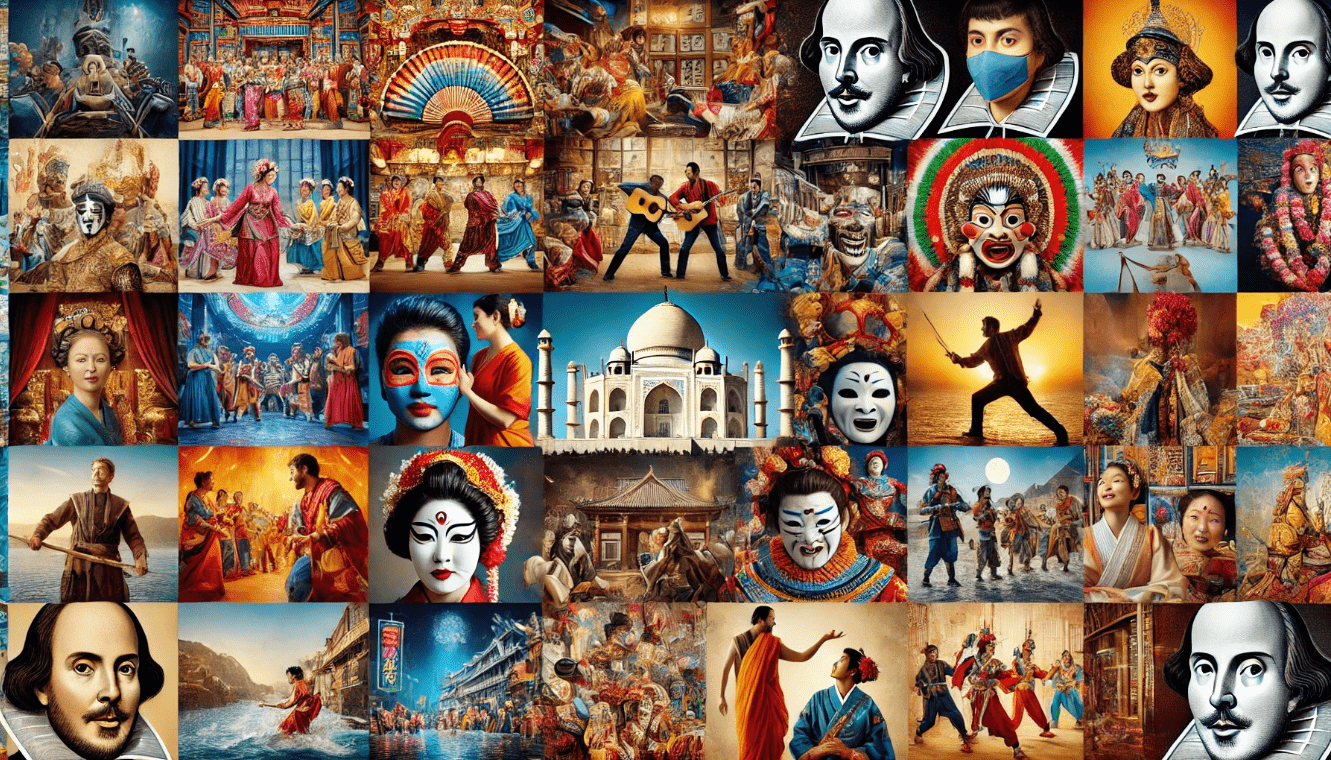
Shakespeare’s Global Reach
Shakespeare’s plays have been translated into every major language and performed across the globe. His themes—love, betrayal, power, and identity—are universal, making his works relatable to audiences from various cultural backgrounds. The global appeal of his theatre lies in its ability to transcend borders and speak to the human experience, no matter where it’s being performed.
- Shakespeare in Non-English-Speaking Countries: From Russia to China, Shakespeare has been embraced and adapted to fit the cultural context of different countries. For example, in Japan, Shakespeare’s plays are often reimagined through traditional Kabuki theatre, creating a fusion of Western and Eastern theatrical traditions. In India, his plays are performed in regional languages, with adaptations reflecting local values, history, and political issues.
- A Cultural Bridge: Shakespeare’s works serve as a cultural bridge between the past and present, as well as between different cultures. Through his plays, global audiences engage in a shared conversation about timeless themes and human experiences, fostering mutual understanding and connection.
Shakespeare’s Influence in the Colonized World
Shakespeare’s theatre played a significant role in colonized countries, where his works were not only performed but also adapted to reflect local struggles, identities, and political movements. For many nations, Shakespeare became a tool for resistance, identity formation, and reclaiming cultural autonomy.
- Shakespeare in Post-Colonial Literature: In many post-colonial societies, Shakespeare’s works were reinterpreted to address local issues such as colonialism, social injustice, and national identity. For example, in Africa, playwrights like Ngũgĩ wa Thiong’o and Wole Soyinka have used Shakespeare’s plays to critique colonial powers and reflect African values and traditions. These adaptations provided a platform for local voices to challenge the cultural domination of Western imperialism.
- Shakespeare as a Symbol of Resistance: In countries like India and the Caribbean, Shakespeare’s plays were used as a symbol of intellectual resistance. By performing his works in local languages or blending them with indigenous art forms, these nations reclaimed Shakespeare’s legacy as a way of asserting their cultural identity and challenging colonial narratives.
Shakespeare and the Development of National Identity
As Shakespeare’s plays spread across the globe, they helped foster national identities in many countries. By performing his works, nations could examine their own cultural values and societal structures, all while engaging with a shared literary tradition. Shakespeare’s theatre offered an opportunity to reflect on local histories, politics, and traditions through a universal lens.
- Shakespeare in the United States: In the US, Shakespeare has been used to explore themes of democracy, freedom, and identity. His works have been adapted to reflect the American experience, from historical interpretations of Julius Caesar to modern takes on Hamlet and Macbeth. These adaptations reflect the evolving national identity of America, where Shakespeare’s themes often intersect with the country’s ongoing struggles with power, justice, and equality.
- Shakespeare in Latin America: In Latin American countries, Shakespeare’s plays are often reimagined to explore the region’s history of colonization, revolution, and social inequality. Directors and playwrights have adapted his work to examine themes of oppression and liberation, creating a unique blend of Shakespearean drama with Latin American cultural identity.
Shakespeare’s Theatre as a Tool for Cultural Preservation
In many countries, Shakespeare’s works have also played a role in preserving and promoting cultural heritage. Through the lens of his plays, many regions have maintained traditional performance styles and passed them on to future generations. In this way, Shakespeare’s theatre has become a platform for both honoring the past and adapting to contemporary cultural shifts.
- Shakespeare Festivals Around the World: Shakespeare festivals have become key cultural events in countries such as the US, UK, South Africa, and Canada. These festivals bring together diverse audiences and celebrate not only Shakespeare’s works but also the cultural diversity of the countries hosting them. By blending Shakespeare’s universal themes with local traditions, these festivals serve as a space for cultural exchange and identity-building.
- Reviving Traditional Arts: In some regions, Shakespearean adaptations have revived traditional forms of performance. In India, for example, adaptations of Shakespeare’s plays are often done through classical dance-drama forms like Kathakali or Bharatanatyam, preserving and promoting these ancient art forms while making Shakespeare’s work accessible to a new generation.
Shakespeare’s Ongoing Global Impact
Today, Shakespeare’s influence continues to be felt worldwide. His works remain a central part of global cultural conversations, and they are adapted in ways that reflect the shifting values and identities of modern societies. Shakespeare’s plays are not only performed in theatres—they inspire films, literature, music, and even political discourse, showing that his theatre is a living, evolving force in cultural identity.
- Cultural Adaptations in the Digital Age: In the age of digital media, Shakespeare’s works have been adapted for films, TV shows, and online platforms, reaching a global audience through streaming services like Netflix. These adaptations offer new ways to engage with Shakespeare’s work, ensuring his continued relevance in an increasingly interconnected world.
- Shakespeare as a Universal Symbol: Shakespeare’s theatre remains a universal symbol of human experience. Regardless of cultural background, audiences around the world continue to find themselves reflected in his works. Whether through the tragedy of Hamlet or the comedy of A Midsummer Night’s Dream, Shakespeare’s themes resonate with the shared struggles, dreams, and identities of people everywhere.
6. The Impact of Shakespeare’s Theatre on Today’s Cultural Landscape
Shakespeare’s theatre continues to hold a significant place in today’s cultural landscape. His work, which has spanned centuries, not only shaped the past but also influences how we view the world today. From theatre productions to popular media, Shakespeare’s themes, characters, and language are still very much alive, helping to define cultural identity in the modern era.
Shakespeare in Education and Modern Literature
Shakespeare’s impact on education is one of the most profound ways his legacy persists. His plays are still a key part of school curricula worldwide, helping students engage with complex themes and develop critical thinking skills. But Shakespeare’s influence doesn’t stop there—it extends into modern literature and storytelling.
- Literature and Storytelling: Many contemporary authors and playwrights draw on Shakespeare’s themes and structures. For instance, novels, plays, and films often mirror the conflicts and character dynamics found in Shakespeare’s work. Stories about family betrayal, love triangles, and political power continue to be rooted in his timeless narratives.
- Studying Human Nature: Shakespeare’s deep dive into human psychology—his exploration of love, guilt, ambition, and madness—remains relevant for modern audiences. By reading his works, students learn about the complexities of human nature, making his plays essential tools for understanding both literature and society.
Shakespeare’s Influence on Theatre Today
Shakespeare’s theatre revolutionized how we view performance. His approach to characters and storytelling set the foundation for modern dramatic arts, and today’s theatre world continues to be inspired by his work.
- Contemporary Adaptations: Shakespeare’s plays are frequently adapted for modern audiences. Directors take his stories and reimagine them in different settings—whether through modern costumes, updated language, or contemporary issues. For example, Macbeth has been adapted into films and plays dealing with political corruption in the modern age, while Romeo and Juliet has inspired countless retellings of tragic love stories.
- Theatrical Innovation: Shakespeare’s use of language, character complexity, and plot structure are still guiding principles in theatre today. New generations of actors, directors, and playwrights build upon his groundbreaking work to craft innovative performances that honor Shakespeare’s legacy while adding new dimensions to storytelling.
Shakespeare and Popular Media
In today’s world, Shakespeare’s influence extends beyond the stage and into mainstream media. His work is continuously referenced and adapted in films, TV shows, music, and even video games.
- Film and Television: Shakespeare’s plays have inspired a wide array of films, both direct adaptations and modern retellings. Movies like The Lion King (inspired by Hamlet) and 10 Things I Hate About You (based on The Taming of the Shrew) show how his stories transcend time and culture. Many movies and shows also borrow from Shakespearean themes, such as power struggles, love, and family loyalty.
- Pop Culture: Shakespeare’s influence can also be seen in the language of everyday life. His phrases and expressions, such as “all that glitters is not gold” and “to be or not to be,” have become part of popular culture, appearing in everything from casual conversations to political speeches.
Shakespeare’s Theatre and Social Movements
Shakespeare’s theatre continues to shape the cultural identity of social and political movements today. His works provide a platform for modern-day creators to address issues of gender, power, justice, and identity.
- Feminist Interpretations: Shakespeare’s plays are frequently re-examined through feminist lenses. Characters like Lady Macbeth or Juliet are portrayed in ways that challenge traditional gender roles, giving voice to modern conversations about women’s rights and representation.
- Social Justice: Shakespeare’s themes of justice, mercy, and inequality resonate with ongoing global movements for equality and human rights. The Merchant of Venice, for example, has been revisited in the context of racial discrimination, while Hamlet and King Lear raise questions about mental health and societal expectations.
Shakespeare in the Digital Age
In the 21st century, the digital age has opened new avenues for Shakespeare’s influence. With the advent of social media, streaming platforms, and digital productions, his work continues to reach audiences who may never set foot in a traditional theatre.
- Online Streaming and Accessibility: Shakespeare’s plays are now widely available on streaming platforms, making his work accessible to global audiences with just the click of a button. Digital productions, some filmed live on stage and others adapted into online formats, continue to bring Shakespeare to new generations in innovative ways.
- Interactive Media: Video games and interactive media are also embracing Shakespeare. Games that explore Shakespearean themes or adapt his plays allow audiences to engage with his works in unique, immersive ways. These digital adaptations ensure that Shakespeare remains relevant in the constantly evolving world of entertainment.
Shakespeare’s Enduring Influence on Cultural Identity
The impact of Shakespeare’s theatre on today’s cultural landscape is undeniable. His exploration of universal human experiences—love, power, betrayal, and identity—continues to inform how we see ourselves and our place in the world. His works encourage us to reflect on our values, challenge social norms, and engage in thoughtful dialogue about the complexities of life.
From the classroom to the stage, from films to social media, Shakespeare’s legacy shapes the way we understand cultural identity in the modern world. His theatre is more than a relic of the past—it is a dynamic, living influence that continues to evolve with the times. 🌍🎭
7. The Legacy of Shakespeare’s Theatre: Challenges and Criticisms
While Shakespeare’s theatre has undeniably left a lasting mark on global cultural identity, it has not been without its share of criticisms. As much as his works continue to shape literature, theatre, and society, they also raise questions about representation, societal values, and historical context. Let’s explore the challenges and criticisms surrounding Shakespeare’s legacy and the ways in which modern adaptations address these concerns.
1. Gender and Female Representation
One of the most significant criticisms of Shakespeare’s theatre is the treatment of women and gender roles. While his plays often feature strong female characters—such as Lady Macbeth, Juliet, and Cleopatra—these women are often portrayed within restrictive societal norms. Many of his female characters are either subjugated by male authority or meet tragic ends due to their roles in patriarchal systems.
- Limited Agency: Female characters in Shakespeare’s plays are often defined by their relationships to men. For example, Juliet’s love for Romeo and Ophelia’s madness in Hamlet are key to their character arcs, limiting their personal agency. This has raised questions about the lack of independent female voices and agency in Shakespeare’s works.
- Modern Reinterpretations: Many contemporary productions of Shakespeare’s plays aim to reimagine female characters with more complexity and autonomy. Directors and playwrights are revisiting his works with a feminist lens, exploring new ways to empower female characters and challenge outdated gender norms.
2. Racial Stereotypes and Ethnocentrism
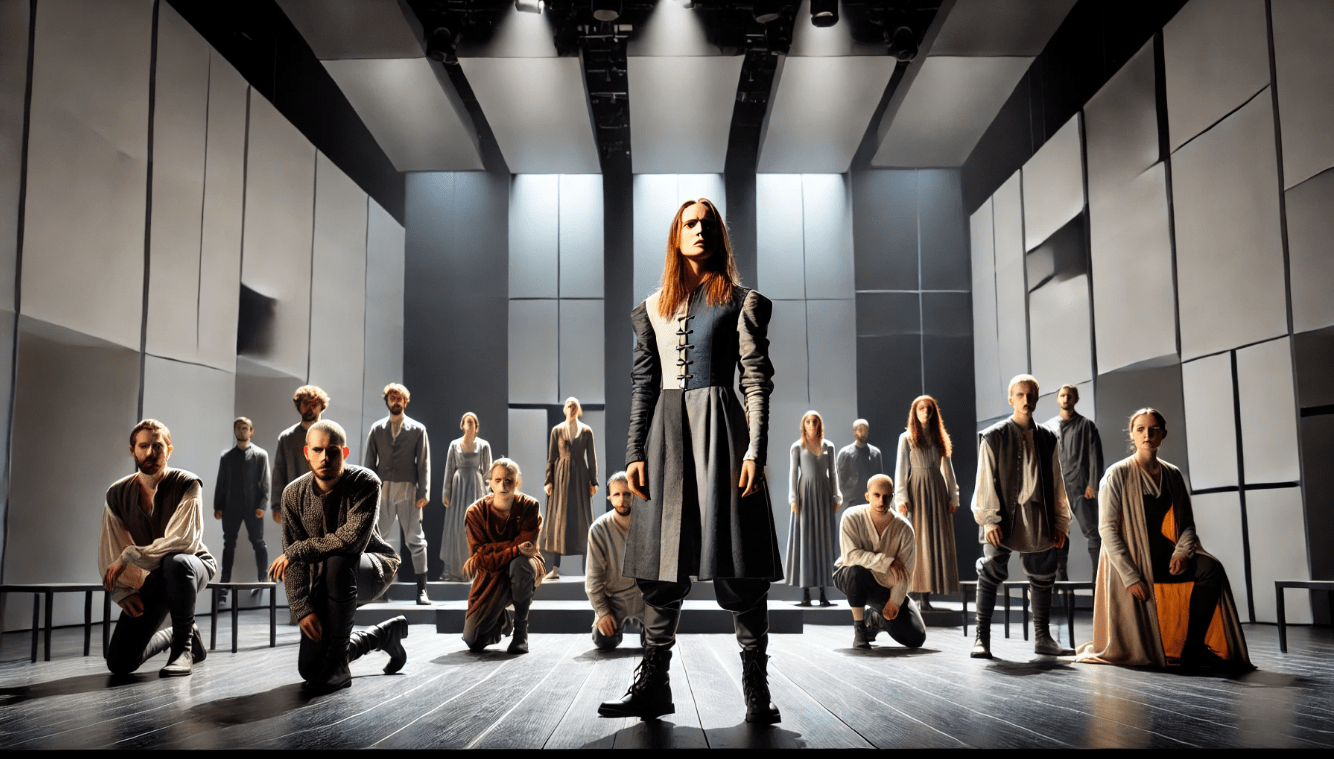
Shakespeare’s plays are often critiqued for their portrayal of race and ethnicity, particularly when it comes to characters from non-European backgrounds. His treatment of characters like Othello (a Moor) or Shylock (a Jewish character) has raised concerns about the perpetuation of racial stereotypes.
- Problematic Representation: In plays like Othello, the titular character is depicted as a noble but tragic outsider, often emphasizing his “otherness” as a source of conflict. Shylock in The Merchant of Venice is similarly depicted as a greedy, vengeful figure, reinforcing negative stereotypes of Jews.
- Reclaiming Identity in Adaptations: In recent years, many productions have worked to challenge these stereotypes. Directors have cast actors from diverse backgrounds and reinterpreted Shakespeare’s characters to reflect more nuanced and complex representations of race and ethnicity, moving beyond outdated and harmful portrayals.
3. Class and Social Hierarchy
Shakespeare’s theatre often explores issues of class, but it also reflects the hierarchical structures of Elizabethan England. Many of his plays examine the tension between different social classes, with power dynamics playing a central role in the narrative. However, some critics argue that Shakespeare’s works sometimes reinforce class divisions, rather than challenging them.
- Reinforcing Hierarchies: In plays like King Lear and Macbeth, Shakespeare critiques the abuse of power, but he also reflects the belief in the natural order of society. This has led some to argue that his works, despite their critiques of authority, ultimately reaffirm social hierarchies.
- Modern Reinterpretations: Today’s adaptations often focus on challenging these social structures and offering new perspectives. Productions may cast actors of various backgrounds and explore themes of social mobility, equality, and justice, highlighting the need for societal change.
4. The Relevance of Shakespeare in the Modern World
Another challenge Shakespeare’s legacy faces is the question of his relevance in the modern world. Critics argue that his archaic language and often outdated themes make his works difficult to connect with today’s audiences. As society continues to evolve, some wonder whether Shakespeare’s works still speak to the issues we face in the 21st century.
- Language Barrier: The Elizabethan English used in Shakespeare’s plays can be challenging for contemporary readers and audiences. The language can sometimes alienate those who are unfamiliar with its structure and vocabulary, making it harder for new generations to engage with his work.
- Modern Adaptations and Accessibility: Modern adaptations of Shakespeare’s plays, such as films and contemporary stage productions, often update the language and setting to make his works more accessible to today’s audiences. These adaptations ensure that Shakespeare remains relevant by highlighting his themes in a modern context—whether through modern-day settings, contemporary issues, or relatable dialogue.
5. Questioning the “Universal” Themes
While Shakespeare’s works have been lauded for their exploration of universal themes like love, power, and betrayal, some critics argue that these themes are not as universal as they might seem. Issues like gender, race, and class are often filtered through a European, and specifically English, lens, making them less applicable to non-Western cultures or contemporary global struggles.
- Eurocentric Bias: Shakespeare’s works are often rooted in the values, norms, and worldview of 16th-century England. His portrayals of love, loyalty, and justice are deeply influenced by the cultural and political climate of his time, which may not resonate with audiences from different historical or cultural backgrounds.
- Global Adaptations and Reinterpretations: In response to this criticism, global adaptations of Shakespeare’s work often contextualize his themes in ways that are more inclusive and relevant to different cultures. For example, Indian adaptations of Macbeth or Hamlet incorporate local customs and issues, making Shakespeare’s themes feel more relevant and accessible to non-Western audiences.
8. How You Can Apply Shakespeare’s Theatre to Understand Your Own Cultural Identity

Shakespeare’s theatre offers a powerful lens through which we can examine our own cultural identity. His exploration of universal themes—love, power, betrayal, and identity—speaks to the human experience across time and space. By engaging with Shakespeare’s work, you can gain deeper insights into the way culture shapes who we are and how we understand ourselves. Here’s how you can apply Shakespeare’s theatre to explore and enhance your own cultural identity.
1. Reflect on Universal Themes in Your Own Life
Shakespeare’s plays are rich in themes that transcend time and culture. Whether you’re grappling with questions of love, justice, or ambition, his characters provide a mirror to our own struggles and desires.
- Love and Relationships: Consider how Shakespeare’s exploration of love in Romeo and Juliet or A Midsummer Night’s Dream might resonate with your own experiences. How do the characters’ relationships reflect the values you hold? Are there lessons you can learn from their mistakes or triumphs in love?
- Power and Identity: In plays like Macbeth or Julius Caesar, Shakespeare delves into the corrupting effects of power and the complexity of self-identity. How does the pursuit of power shape your own life or the world around you? Are there societal pressures or ambitions that influence your sense of self?
By reflecting on these themes, you can better understand how your personal identity is shaped by universal human experiences. Shakespeare’s characters might make you reconsider how you see yourself and your place in the world. 🎭
2. Explore the Social and Cultural Context of His Plays
Shakespeare’s works were written in the context of Elizabethan England, a time when social, political, and cultural norms were vastly different from today. By exploring the historical context of his plays, you can gain a deeper understanding of how culture influences identity.
- Historical Influence: Shakespeare often commented on issues like class, gender, and authority. For example, in King Lear, the exploration of social hierarchy and familial duty challenges the expectations of that era. How do these social dynamics compare to your own cultural experience? Are there societal structures that influence how you see yourself or how you’re perceived by others?
- Cultural Values: Shakespeare’s treatment of gender, race, and power provides an opportunity to reflect on how these issues continue to shape cultural identities today. Are there cultural norms or values in your own life that influence the roles you play or the expectations you face?
By applying Shakespeare’s social and cultural context to your own life, you can gain a broader perspective on how history and culture shape identity. 🌍
3. Use Shakespeare to Challenge Traditional Views
Shakespeare didn’t just reflect society; he often challenged the cultural norms of his time. His plays invite us to question assumptions about love, justice, and morality. This makes his theatre a powerful tool for exploring and challenging your own cultural beliefs.
- Breaking Gender Norms: Consider how Shakespeare subverted traditional gender roles. Characters like Viola in Twelfth Night or Rosalind in As You Like It disguise themselves and explore themes of identity, gender, and self-expression. How do these characters challenge traditional notions of gender in your own culture? How can their experiences help you rethink your own views on gender and identity?
- Examining Justice and Power: Many of Shakespeare’s plays, such as The Merchant of Venice or Measure for Measure, explore the complexities of justice. How do these works invite you to reflect on fairness, law, and morality in your own culture? Are there aspects of justice that you believe need to be redefined?
Shakespeare’s work can be a powerful tool to challenge and reshape how you understand cultural norms and identity. By questioning the status quo, you open yourself to new possibilities for personal and cultural growth. 💡
4. Engage with Modern Adaptations of Shakespeare
One of the best ways to connect Shakespeare’s themes to your own cultural identity is through modern adaptations of his plays. These reinterpretations often reflect contemporary issues and diverse cultural experiences, making Shakespeare’s work feel more relevant today.
- Films and TV: Many modern films and shows are based on Shakespeare’s plays, often reimagining his characters and stories for today’s world. For example, 10 Things I Hate About You (based on The Taming of the Shrew) and The Lion King (based on Hamlet) offer fresh takes on Shakespeare’s themes. By watching these adaptations, you can see how his ideas resonate with modern cultural identities.
- Global Reinterpretations: Shakespeare’s plays have been adapted in many different cultural settings, from Bollywood films to African theatre productions. These adaptations incorporate local customs, issues, and traditions, giving you a chance to see how Shakespeare’s universal themes are understood in different cultural contexts.
Engaging with these modern adaptations allows you to see how Shakespeare’s work is constantly evolving to meet the needs and perspectives of different cultural groups. This can deepen your understanding of your own cultural identity in a global context. 🌏
5. Use Shakespeare’s Characters to Reflect on Your Own Identity
The characters in Shakespeare’s plays are often deeply complex, grappling with questions of identity, power, and personal responsibility. By examining these characters, you can gain insights into your own sense of self.
- Character Reflection: Identify with a particular Shakespearean character. Do you see yourself in Hamlet’s existential questioning? Are you drawn to the ambition of Lady Macbeth or the resilience of Juliet? Reflecting on these characters’ journeys can help you better understand your own personal and cultural identity.
- Conflict and Resolution: Many Shakespearean characters face internal and external conflicts that force them to confront who they are. These struggles often mirror the challenges we face in real life. How do these characters’ experiences help you better understand your own challenges with identity, societal expectations, or personal growth?
Shakespeare’s characters offer a powerful mirror for self-reflection. By exploring their struggles and triumphs, you can gain a deeper understanding of your own journey. 🤔
Shakespeare’s Enduring Influence on Cultural Identity

Shakespeare’s theatre has had a profound and lasting impact on cultural identity across generations. From the Elizabethan stage to modern adaptations, his works continue to resonate with audiences around the world. By exploring timeless themes like love, power, and justice, Shakespeare’s plays offer a window into the complexities of human nature and society—an insight that remains as relevant today as it was when first performed.
Through his complex characters, innovative language, and exploration of universal issues, Shakespeare’s theatre serves as both a reflection and a challenge to cultural norms. His works have been reinterpreted in countless ways, making them adaptable to various social, political, and cultural contexts. Whether through feminist reimaginings, racial and ethnic reinterpretations, or modern-day adaptations, Shakespeare’s influence allows us to examine and understand our own cultural identities in new, thought-provoking ways.
As we continue to engage with his plays—whether through the classroom, the stage, or contemporary media—we are reminded of the power of storytelling to shape our understanding of the world and our place within it. Shakespeare’s theatre is not just a relic of the past; it is a living, breathing force that continues to shape cultural identities globally.
By applying Shakespeare’s themes to our own lives, we can better understand how our personal and cultural identities are formed, challenged, and transformed. As we reflect on his works and their relevance to today’s world, we gain the opportunity to explore deeper questions about ourselves, our societies, and the universal human experiences that connect us all.
Shakespeare’s legacy is one that invites us to think critically, embrace diversity, and seek greater understanding across cultures. And, as we look to the future, his theatre will undoubtedly continue to shape and influence cultural identity for generations to come. 🌍🎭
Frequently Asked Questions (FAQs)
1. How did Shakespeare’s theatre impact cultural identity?
Shakespeare’s theatre helped shape cultural identity by addressing universal themes such as love, power, justice, and human nature. His plays provided a platform for reflecting on societal norms, social justice, and personal identity, which influenced both contemporary and future generations. His language and characters continue to resonate across cultures, creating shared experiences that transcend time.
2. Why is Shakespeare still relevant today?
Shakespeare’s themes are timeless, exploring human emotions and societal issues that are still relevant today, such as ambition, betrayal, and love. His works are frequently adapted to modern settings, making them relatable to contemporary audiences. Whether through films, theatre, or literature, Shakespeare’s influence on global culture continues to shape how we view identity and society.
3. How has Shakespeare influenced modern literature and theatre?
Shakespeare revolutionized literature and theatre by creating complex characters, intricate plots, and a rich use of language. His influence is seen in modern storytelling, with many playwrights, authors, and filmmakers drawing on his themes and structures. His works serve as a foundation for exploring personal and societal conflicts, deeply influencing modern narratives in theatre and literature.
4. In what ways has Shakespeare’s theatre been adapted across cultures?
Shakespeare’s plays have been adapted in numerous cultural contexts, from Bollywood adaptations in India to productions in Africa and Japan. These adaptations often incorporate local customs, politics, and history, making Shakespeare’s themes resonate with diverse audiences while exploring local cultural identities and social issues.
5. How did Shakespeare’s theatre influence social movements?
Shakespeare’s exploration of themes like power, justice, and human rights has inspired many social movements. His works have been reinterpreted to address modern struggles such as gender equality, racial justice, and political freedom. Productions that focus on these themes continue to provoke thought and inspire change in contemporary societies.
6. What role did Shakespeare’s language play in shaping cultural identity?
Shakespeare’s use of language enriched the English language, introducing hundreds of new words and phrases that are still in use today. His creative expressions have shaped how we communicate and understand the world, contributing to cultural identity through literature, education, and everyday language.
7. How can Shakespeare’s plays help us understand our own cultural identity?
By exploring the universal themes in Shakespeare’s plays, such as love, conflict, and societal roles, you can reflect on how these issues shape your own identity. Shakespeare’s works encourage self-exploration by asking important questions about power, morality, and personal choices, making them a tool for understanding how culture influences who we are.
8. What criticisms exist regarding Shakespeare’s treatment of race and gender?
Shakespeare’s plays have been criticized for reinforcing gender stereotypes and racial biases. Characters like Othello and Shylock have been viewed as perpetuating harmful stereotypes. However, modern adaptations often address these issues by reinterpreting these characters and themes to provide a more inclusive and nuanced perspective.
